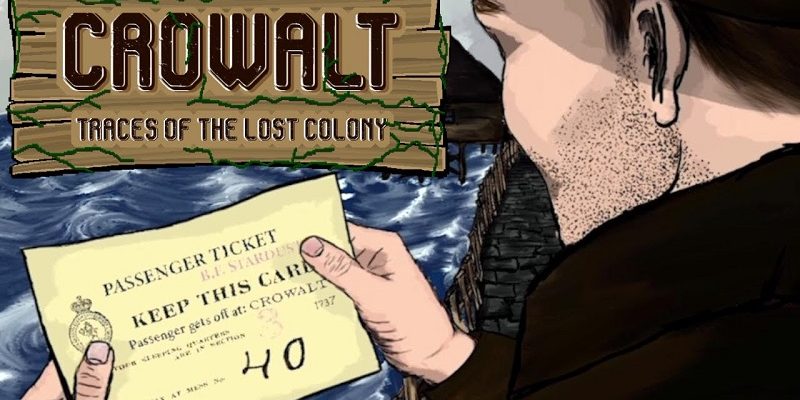The point and click adventure genre, while not as being the main narrative genre that it used to be in the early 90s, is still pretty alive and well. Proof is that each year there is an onslaught of titles released, from the ultra professional and always well done adventures published by Wadjet Eye, to the more amateur, but still very much interesting, ones. Unfortunately, this also means that it is very much a crowded genre, so much so that each title must bring something unique to have at least half a chance of being noticed.
Crowalt does the right thing right away by choosing to take place in quite the unique setting: early 18th century colonial America. Indeed, the story takes place in 1737, with explorer and adventurer Hugh Radcliffe searching for news about the lost colony. These were people who travelled from Europe to the US in 1587, only to mysteriously disappear into thin air, leaving only a single mysterious word etched on a tree: Crowalt. Hugh’s drive and life obession to find out what happened will be also the main plot focus of the game.
The game follows the most classic of point and click adventure designs: pick up everything that isn’t nailed down, combine items or use them to solve puzzles and talk to characters to progress through the story. Luckily, there are no weird obtuse puzzles and there is also a specific key to show all potential interactive items on screen. Well done on the developers’ part. Unfortunately, Crowalt is pretty heavy with fetch quests, which might be considered as ways to earn the trust of the people in the town, but they do still feel like little more than quick ways to pad out the runtime.
For example, at one point Hugh is asked to produce a vest in order to talk to the chief of the Indian tribe. Well, to get hold of said item he will have to: take a rope, talk to another character, get into the warehouse at the docks, find all four pieces of the lost fabric so that the seamstress will help him, take a letter to a woman who lives on another island, etc. While this is surely one of the main puzzle in what is otherwise a short adventure, it clearly gives the impression that the design went a bit too far in finding possible things to keep Hugh busy. So much so that, at one point, Hugh himself shows suprise when someone does not actually give him a quest in exchange for something!

Along with classic adventure game puzzles, there are a few minigames. Now, these have been known to be the main crux for many adventure game players, but I feel that, overall, in Crowalt they are mostly fine. While some did not like it, I think the best minigame is the one right at the beginning where Hugh is called to serve beer to customers, but also mind not to waste too much product and, thus, use waters to balance the taste out. While at times it does not feel to make much sense, it is still smartly used to introduce the player to many characters which will show up later. It is that rare minigame that is actually used to further the story.
Unfortunately, the same cannot be said for the other minigames which, at best, seem to be little more than ways to just pad out the runtime of the game. Like throwing a stone to the crow or having to help the seamstress to produce our vest, which barely makes sense to begin with, since at this point we could have just done without her help altogether!

Graphically, Crowalt is pretty low budget, clearly not hiding its roots here, but does feature some very nice hand drawn backgrounds. While I am not a fan of the ultrapixelated character design, I also generally did not mind it, but unfortunately I cannot say the same of the rather stilted animations. Also, the simple pixelated art for the characters means that the facial features for each character are pretty limited. Perhaps some close-ups might have worked a long way in making the cast more memorable.
The soundtrack, overall, is pretty well done, but unfortunately relies on a bit too much repetition of the main theme: which ends up being the one the player will be hearing over and over again while travelling through the town square and the various houses in Crowalt. It is a shame because the other tracks are probably even better than the main theme, but chances are, the player will hear them maybe a couple of times over the short 3-4 hours of gameplay. There are also some scenes, like in the church, with no soundtrack which does not really seem to enhance their mood or anything.

The story could be somehwat considered as the main saving grace of the point and click adventure, going for an interesting balance between historical facts, horror, sci-fi and humour. Being set in an atypical time for adventures, it might already be of interest for anyone looking for something different, especially on how it touches upon rarely seen topics like Indian tribes living closely with colonies. A couple of scenes are also pretty eerie, with the absence of soundtrack and a few macabre task to complete.
Unfortunately, the writing is marred by various typos and sentences that don’t really seem to make sense. Both show the origin of the writer as someone who clearly does not speak English as a first language. Which should not really be a problem, as long as one employs an editor, which should have been the team’s priority here. Also, while the big twist at the end is interesting, it ends up being barely noticeable since the game just ends right after that, on a peculiar “to be continued” note, which just does not feel satisfying at all. Hugh is also not really a memorable protagonist, since we barely know anything about him, except his obsession for finding out about the lost colony (again, never really explained). Oh yes, and his tendency to never shut up.

Unfortunately, Crowalt – while not a bad game per se – did really need more attention to the finer details to make it stand above the others. While it is an okay adventure for a team’s first game, in the competitive market for modern point and click adventures, it could probably only be of interest to hardcore completists who have to play every single adventure available or newcomers who just want something simple to while away a few hours. Everyone else can just skip it, at least until the team sits down and fixes the writing and some of the other issues.
Buy the game here. Review key was kindly provided by the developer.
Thank you for reading.
If you would like to help me to keep the Genesis Temple project running, be sure to check out my patreon or alternatively, offer me a coffee.





